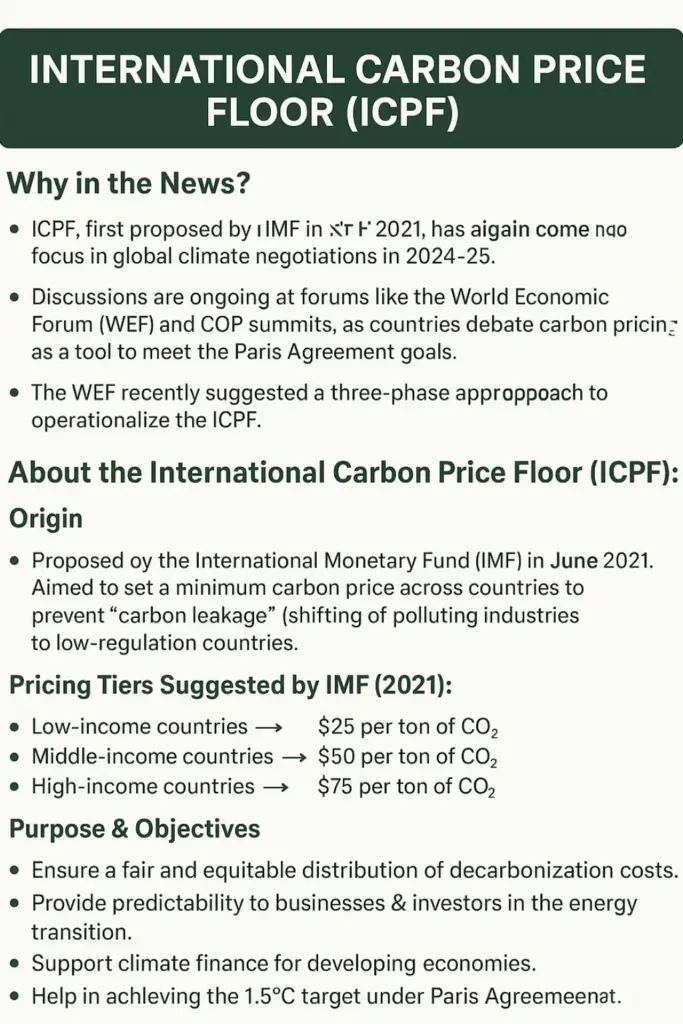September 2, 2025
International Carbon Price Floor (ICPF)
Why in the News?
The International Carbon Price Floor (ICPF), first proposed by the IMF in 2021, has again come into focus in global climate negotiations in 2024–25.
- Discussions are ongoing at forums like the World Economic Forum (WEF) and COP summits, as countries debate carbon pricing as a tool to meet the Paris Agreement goals.
- The WEF recently suggested a three-phase approach to operationalise the ICPF, making it a key topic in climate policy and global climate finance debates.
About the International Carbon Price Floor (ICPF):
Origin:
- Proposed by the International Monetary Fund (IMF) in June 2021.
- Aimed to set a minimum carbon price across countries to prevent “carbon leakage” (shifting of polluting industries to low-regulation countries).
Pricing Tiers Suggested by IMF (2021):
- Low-income countries → $25 per ton of CO₂
- Middle-income countries → $50 per ton of CO₂
- High-income countries → $75 per ton of CO₂
Purpose & Objectives:
- Ensure a fair and equitable distribution of decarbonization costs.
- Provide predictability to businesses & investors in the energy transition.
- Support climate finance for developing economies.
- Help in achieving the 1.5°C target under the Paris Agreement.
World Economic Forum (WEF) Proposal (2022–24):
- Suggested a three-phase roadmap for ICPF:
- Phase 1: Voluntary adoption & transparency in carbon pricing policies.
- Phase 2: Broader participation with carbon price convergence.
- Phase 3: Binding global framework for carbon price coordination.
Other proposals by IMF :
Climate Finance Facility (2022–23):
- The IMF proposed expanding the Resilience and Sustainability Trust (RST) to provide long-term, low-interest financing to developing nations for climate action.
- Aimed at helping vulnerable economies manage transition risks and climate shocks.
Green Public Investment & Subsidy Reforms:
- The IMF recommended phasing out fossil fuel subsidies and redirecting funds to renewable energy and green infrastructure.
- Suggested green taxes and stronger climate-related fiscal frameworks.
Global Carbon Price Coordination (Beyond ICPF):
- IMF has been advocating for a minimum global carbon price (ICPF was one model).
- It also explored international emissions trading systems to harmonize carbon markets.
WEF Proposals:
Three-Phase International Carbon Price Roadmap (linked to ICPF):
- Phase 1: Voluntary transparency.
- Phase 2: Gradual convergence of carbon prices.
- Phase 3: Binding global framework.
Mission Possible Partnership (MPP):
- WEF initiative to decarbonize hard-to-abate sectors (steel, cement, shipping, aviation) through collaborative financing and carbon pricing.
First Movers Coalition (2021):
- Launched at COP26 with the U.S. and WEF.
- Companies commit to buy low-carbon products (green steel, sustainable aviation fuel, etc.) to create demand-pull for clean technologies.
Global Risk Report & Climate Governance Principles:
- WEF regularly publishes frameworks on climate governance, ESG standards, and green finance mechanisms to guide global investment.
September 24, 2025
September 23, 2025
September 22, 2025
September 17, 2025

